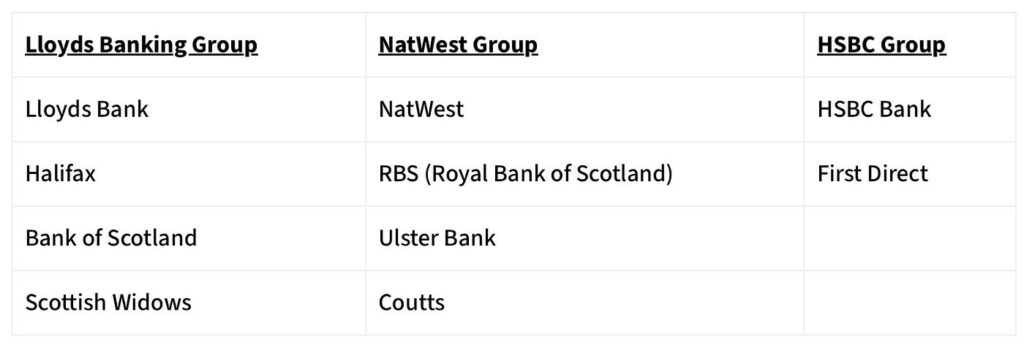Hello MCR

How Safe is the FSCS £85000 Compensation Scheme?
If you’re lucky enough to have a 6 figure sum lying around in savings, you’re probably aware of the FSCS protection: You’re covered on your first £85k with each bank/savings provider.
So if you want to feel 100% protected, the idea is not to hold more than £85k with a single bank/financial institution.
Two things to say about that:
- There’s no such thing as 100% safe
- Different banks can belong to the same banking group
Is the FSCS Compensation Scheme Bullet Proof?
The likelihood of the FSCS not meeting its obligations is extremely low. Same for the likelihood of a major bank to collapse — the UK is highly regulated. But I think it’s important to know that there’s no such thing as 100% safe.
A major failure is probably less than 1% likely, but it can happen. In addition, the FSCS aims to compensate customers within 7 days. Even if it’s able to, realistically it might take longer. Or much longer.
I say all this because it’s important to be aware of these things.
In fact, I actually find it liberating. Everyone is just trying to protect their money the best they can. 100% safe doesn’t exist. From Bitcoin to hiding your money under your mattress, everything has some risk-reward ratio to it. In fact, the only certainty is that sitting on cash is a losing game due to inflation. In that sense, it’s true to say it’s risk free; it’s a certain loss!
The FSCS £85k Protection
The protection is for £85,000 per bank, per person. For joints accounts, each person is entitled to £85k (£170k in total). That seems self explanatory enough, except that some banks operate under the same umbrella — the same Banking Group.
For example, the Lloyds Banking Group incorporates Lloyds Bank, Halifax, Bank of Scotland, and Scottish Widows. So your £85k cover is shared between those entities. Same goes for NatWest Group (which includes NatWest, RBS and Ulster) and HSBC Group (HSBC UK, First Direct).
That’s why Switch Rewards are also capped in this way. You’ve probably noticed how the new NatWest offer is only for those who haven’t benefited from an RBS switch etc.
There are really just 3 entities that are relevant: Lloyds Banking Group, NatWest Group, and HSBC Group. Barclays, for example, owns Barclaycard (as you may have guessed) but there’s no retail bank hiding under its umbrella. Same for Santander, TSB, Nationwide etc.
Here they are:

What about smaller players?
When downloading a financial app like Moneybox, Plum, or Chip, most people instinctively imagine them to be the providers as well. That’s not the case. Always look out for the underlying bank, the actual provider of the account.
Some apps make it very clear, some seem to hide it.
Here are two examples
Chip
Chip is as clear as can be: “ Powered by ClearBank “

Moneybox
On the other hand, Moneybox isn’t exactly forthcoming. I tried looking it up on the app and couldn’t find it. Googled it, and still no luck. So I ended up messaging them on the app and got this reply:
Your Cash ISA funds are held with multiple third party partner banks, all of which are FSCS protected for up to £85,000. Note that the proportion of
money held with each bank may change over time.
Currently, the banks we hold funds with for the Cash ISA are:
Clydesdale Bank PLC
HSBC Bank PLC
Santander UK PLC
Barclays Bank PLC
First Abu Dhabi Bank P.J.S.C.
Aldermore Bank PLC
Qatar National Bank (Q.P.S.C.)
National Westminster Bank PLC
Bank of Scotland PLC
Lloyds Bank PLC
Moneybox team
In any case, here’s a useful list of popular accounts. Remember that offers, rates, and providers change all the time.
Chip
Provider: Clearbank
Monzo
Provider: Monzo, Shawbrook Bank
Starling
Provider: Starling Bank
Chase
Provider: JP Morgan Chase
Marcus
Provider: Goldman Sachs
Plum
Provider: Investec
Moneybox simple Saver
Provider: Santander
Moneybox Cash ISA
Providers:
Clydesdale Bank PLC
HSBC Bank PLC
Santander UK PLC
Barclays Bank PLC
First Abu Dhabi Bank P.J.S.C.
Aldermore Bank PLC
Qatar National Bank (Q.P.S.C.)
National Westminster Bank PLC
Bank of Scotland PLC
Lloyds Bank PLC
Visit FSCS
As always, this is not financial advice. Please do your own research and/or consult a professional before making any financial decisions.


